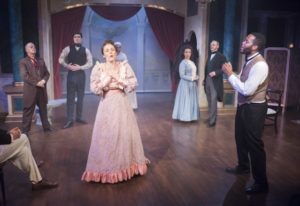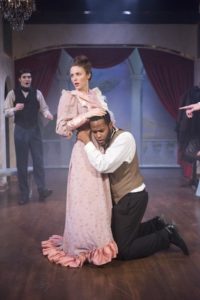
 Recommended *** Being a first is hard. James Meredith, the first African-American to enroll in the University of Mississippi, wrote in Esquire’s 2013 issue, “Ole Miss kicked my butt and they’re still celebrating.” It wasn’t much better for Ira Aldridge, the first African-American actor to appear on professional European stages. Originally an actor with The African Theatre in New York, Aldridge left the United States after his first company was closed by a pro-slavery drama critic who was also a sheriff. In 2012, his story was picked up by Bengali-British actress Lolita Chakrabarti, who was inspired to write Red Velvet with her husband in the lead role. Now in a Chicago premiere expertly directed by Michael Menendian, the play nonetheless takes a little while to get started, but it directly addresses several of the issues surrounding casting and the conflation between artists’ desire to change society and self-advancement which have been so contentious in the performing arts as of late, and as shown by the play, for a long time before now.
Recommended *** Being a first is hard. James Meredith, the first African-American to enroll in the University of Mississippi, wrote in Esquire’s 2013 issue, “Ole Miss kicked my butt and they’re still celebrating.” It wasn’t much better for Ira Aldridge, the first African-American actor to appear on professional European stages. Originally an actor with The African Theatre in New York, Aldridge left the United States after his first company was closed by a pro-slavery drama critic who was also a sheriff. In 2012, his story was picked up by Bengali-British actress Lolita Chakrabarti, who was inspired to write Red Velvet with her husband in the lead role. Now in a Chicago premiere expertly directed by Michael Menendian, the play nonetheless takes a little while to get started, but it directly addresses several of the issues surrounding casting and the conflation between artists’ desire to change society and self-advancement which have been so contentious in the performing arts as of late, and as shown by the play, for a long time before now.
Ira Aldridge died in Lodz in 1867, and the play opens shortly before his death. We first see him, played by Brandon Greenhouse, as a cantankerous kook who blames playing the role of Lear for his mental and physical collapse. It doesn’t help that he is being harassed by Halina Wozniak (Sophia Menendian), an ambitious young female reporter who is desperate to land an interview with Aldridge to prove her value. Unfortunately for Halina, her research into Aldridge’s life was overly focused on his recent successes on the European continent, and she accidently offends him by raising the bitter decades he spent touring the English provinces with a wife he has since divorced, and a nightmarish debut at Covent Garden in 1833. Since this is a play instead of a musical revue, Aldridge orders the reporter out and refuses to recount his life to her. But as he broods on the Covent Garden incident, we see it unfold on a set designed by Ray Toler to put us in the nineteenth century theatre.
Edmund Kean, the greatest Shakespearean actor of the age, had a heart attack onstage while playing Othello, and the rest of the cast is agitated. The standard practice for this kind of situation was for all the other actors of the same sex to move up one rank in role, with the person playing Iago taking over the role of Othello, Cassio taking over Iago, and Rodrigo taking over Cassio. While they wait for updates on Kean, they debate slavery, with the young idealist, Henry Forester (Tim Martin), convinced it will soon be abolished throughout the British Empire, and the cynical Bernard Wade (Scott Olson) proclaiming that somebody always has to be exploited. The company is a bit confused when the theatre manager, Pierre LaPorte (Matthew Klingler) informs them that he has cast another actor to play Othello, but they’ve all heard good things about Aldridge. However, only Forester had heard he was black, and this becomes a huge problem.
Up until this point, Chakrabarti’s script is laden with exposition, but once Aldridge starts interacting with Ellen Tree (Tuckie White), the actress playing Desdemona, a complex character dynamic makes the play much more interesting. In the days before directors, the actor in the lead role gave instructions to the rest of the company, and Tree, though skeptical of Aldridge, is professional enough to accept his changes. He is also gracious enough to listen to her suggestions. Greenhouse and White’s performances show us very effectively how two intelligent, passionate people pushed each other’s growth, and the sudden spark between them is not only believable, but sympathetic despite them both already being in relationships. Even more engaging is the confrontation between Greenhouse and Klingler’s characters in the second act, after their hopes for artistic acceptance have been dashed and their personal relationships have been hopelessly marred by politics. Here, Chakrabarti’s writing is dramatically exciting, and examines the political issues it raises with the most eloquence.
Red Velvet owes a debt to Jeffrey Hatcher’s Stage Beauty, a 2004 film adapted from Hatcher’s earlier play. It depicted Edward Kynaston, the last Shakespearean boy-actor, and his replacement, Margaret Hughes, the first professional English actress. Kynaston’s line that there is no trick in a woman playing a woman is echoed nearly verbatim by Charles Kean (Tyler Rich) in regard to Aldridge playing Othello. The difference is that Kynaston idealized women, while the younger Kean, the nineteenth century critics quoted in the play, and Aldridge’s other detractors openly hated black people. And just as Hatcher’s Hughes points out that Desdemona isn’t even a particularly flattering portrait of a woman, Chakrabarti has Connie (Anna Dauzvardis), a black woman, tell Aldridge that attempts to turn Othello into a model of black dignity are fighting the text. Chakrabarti’s play, however, is much more focused on the newcomer’s point of view, and on the modern actor’s anxieties over who “is allowed” to do what. Aldridge is interested in early naturalism and want to depict people with all their complexities and flaws, but his audience isn’t ready for that, and his ability to alter hearts and minds is much more limited than he’d thought. These moments are where Red Velvet is at its best, and the window into the fascinating history of African-Americans onstage makes it worth a look.
Red Velvet will continue at Raven Theatre, 6157 N Clark St, Chicago through November 27. Performances are as follows:
 Thursdays 7:30 p.m. (except November 24)
Thursdays 7:30 p.m. (except November 24)
Fridays 7:30 p.m.
Saturdays 7:30 p.m.
Sundays 3:00 p.m.
Tickets are $46, with discounts for online purchases, seniors, teachers, students/active military and veterans, groups, and patrons under 30 on Thursdays. Tickets may be purchased at raventheatre.org or by calling 773-338-2177. Running time is two hours and five minutes, with one intermission.
To see what others are saying, visit www.theatreinchicago.com, go to Review Round-Up and click at “Red Velvet.”
There is parking at the theater as well as on street, some metered, but most free. The Clark Street Bus #22 is probably the easiest transportation in the area.






More Stories
“Dummy in Diaspora”
“The Magic School Bus: Lost in the Solar System”
“February House” reviewed by Julia W. Rath